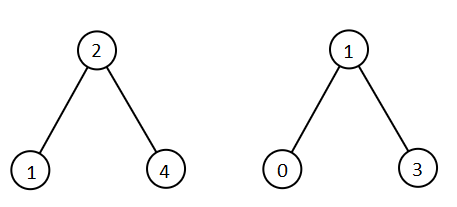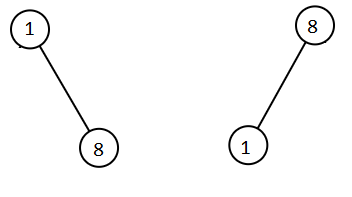代码拉取完成,页面将自动刷新
同步操作将从 doocs/leetcode 强制同步,此操作会覆盖自 Fork 仓库以来所做的任何修改,且无法恢复!!!
确定后同步将在后台操作,完成时将刷新页面,请耐心等待。
给你 root1 和 root2 这两棵二叉搜索树。请你返回一个列表,其中包含 两棵树 中的所有整数并按 升序 排序。.
示例 1:

输入:root1 = [2,1,4], root2 = [1,0,3] 输出:[0,1,1,2,3,4]
示例 2:

输入:root1 = [1,null,8], root2 = [8,1] 输出:[1,1,8,8]
提示:
[0, 5000] 范围内-105 <= Node.val <= 105# Definition for a binary tree node.
# class TreeNode:
# def __init__(self, val=0, left=None, right=None):
# self.val = val
# self.left = left
# self.right = right
class Solution:
def getAllElements(self, root1: TreeNode, root2: TreeNode) -> List[int]:
def dfs(root, t):
if root is None:
return
dfs(root.left, t)
t.append(root.val)
dfs(root.right, t)
def merge(t1, t2):
ans = []
i = j = 0
while i < len(t1) and j < len(t2):
if t1[i] <= t2[j]:
ans.append(t1[i])
i += 1
else:
ans.append(t2[j])
j += 1
while i < len(t1):
ans.append(t1[i])
i += 1
while j < len(t2):
ans.append(t2[j])
j += 1
return ans
t1, t2 = [], []
dfs(root1, t1)
dfs(root2, t2)
return merge(t1, t2)
/**
* Definition for a binary tree node.
* public class TreeNode {
* int val;
* TreeNode left;
* TreeNode right;
* TreeNode() {}
* TreeNode(int val) { this.val = val; }
* TreeNode(int val, TreeNode left, TreeNode right) {
* this.val = val;
* this.left = left;
* this.right = right;
* }
* }
*/
class Solution {
public List<Integer> getAllElements(TreeNode root1, TreeNode root2) {
List<Integer> t1 = new ArrayList<>();
List<Integer> t2 = new ArrayList<>();
dfs(root1, t1);
dfs(root2, t2);
return merge(t1, t2);
}
private void dfs(TreeNode root, List<Integer> t) {
if (root == null) {
return;
}
dfs(root.left, t);
t.add(root.val);
dfs(root.right, t);
}
private List<Integer> merge(List<Integer> t1, List<Integer> t2) {
List<Integer> ans = new ArrayList<>();
int i = 0, j = 0;
while (i < t1.size() && j < t2.size()) {
if (t1.get(i) <= t2.get(j)) {
ans.add(t1.get(i++));
} else {
ans.add(t2.get(j++));
}
}
while (i < t1.size()) {
ans.add(t1.get(i++));
}
while (j < t2.size()) {
ans.add(t2.get(j++));
}
return ans;
}
}
/**
* Definition for a binary tree node.
* struct TreeNode {
* int val;
* TreeNode *left;
* TreeNode *right;
* TreeNode() : val(0), left(nullptr), right(nullptr) {}
* TreeNode(int x) : val(x), left(nullptr), right(nullptr) {}
* TreeNode(int x, TreeNode *left, TreeNode *right) : val(x), left(left), right(right) {}
* };
*/
class Solution {
public:
vector<int> getAllElements(TreeNode* root1, TreeNode* root2) {
vector<int> t1;
vector<int> t2;
dfs(root1, t1);
dfs(root2, t2);
return merge(t1, t2);
}
void dfs(TreeNode* root, vector<int>& t) {
if (!root) return;
dfs(root->left, t);
t.push_back(root->val);
dfs(root->right, t);
}
vector<int> merge(vector<int>& t1, vector<int>& t2) {
vector<int> ans;
int i = 0, j = 0;
while (i < t1.size() && j < t2.size()) {
if (t1[i] <= t2[j])
ans.push_back(t1[i++]);
else
ans.push_back(t2[j++]);
}
while (i < t1.size()) ans.push_back(t1[i++]);
while (j < t2.size()) ans.push_back(t2[j++]);
return ans;
}
};
/**
* Definition for a binary tree node.
* type TreeNode struct {
* Val int
* Left *TreeNode
* Right *TreeNode
* }
*/
func getAllElements(root1 *TreeNode, root2 *TreeNode) []int {
var dfs func(root *TreeNode) []int
dfs = func(root *TreeNode) []int {
if root == nil {
return []int{}
}
left := dfs(root.Left)
right := dfs(root.Right)
left = append(left, root.Val)
left = append(left, right...)
return left
}
merge := func(t1, t2 []int) []int {
var ans []int
i, j := 0, 0
for i < len(t1) && j < len(t2) {
if t1[i] <= t2[j] {
ans = append(ans, t1[i])
i++
} else {
ans = append(ans, t2[j])
j++
}
}
for i < len(t1) {
ans = append(ans, t1[i])
i++
}
for j < len(t2) {
ans = append(ans, t2[j])
j++
}
return ans
}
t1, t2 := dfs(root1), dfs(root2)
return merge(t1, t2)
}
/**
* Definition for a binary tree node.
* class TreeNode {
* val: number
* left: TreeNode | null
* right: TreeNode | null
* constructor(val?: number, left?: TreeNode | null, right?: TreeNode | null) {
* this.val = (val===undefined ? 0 : val)
* this.left = (left===undefined ? null : left)
* this.right = (right===undefined ? null : right)
* }
* }
*/
function getAllElements(root1: TreeNode | null, root2: TreeNode | null): number[] {
const res = [];
const stacks = [[], []];
while (root1 != null || stacks[0].length !== 0 || root2 != null || stacks[1].length !== 0) {
if (root1 != null) {
stacks[0].push(root1);
root1 = root1.left;
} else if (root2 != null) {
stacks[1].push(root2);
root2 = root2.left;
} else {
if (
(stacks[0][stacks[0].length - 1] ?? { val: Infinity }).val <
(stacks[1][stacks[1].length - 1] ?? { val: Infinity }).val
) {
const { val, right } = stacks[0].pop();
res.push(val);
root1 = right;
} else {
const { val, right } = stacks[1].pop();
res.push(val);
root2 = right;
}
}
}
return res;
}
// Definition for a binary tree node.
// #[derive(Debug, PartialEq, Eq)]
// pub struct TreeNode {
// pub val: i32,
// pub left: Option<Rc<RefCell<TreeNode>>>,
// pub right: Option<Rc<RefCell<TreeNode>>>,
// }
//
// impl TreeNode {
// #[inline]
// pub fn new(val: i32) -> Self {
// TreeNode {
// val,
// left: None,
// right: None
// }
// }
// }
use std::cell::RefCell;
use std::rc::Rc;
impl Solution {
pub fn get_all_elements(
root1: Option<Rc<RefCell<TreeNode>>>,
root2: Option<Rc<RefCell<TreeNode>>>
) -> Vec<i32> {
fn dfs(root: &Option<Rc<RefCell<TreeNode>>>, t: &mut Vec<i32>) {
if let Some(root) = root {
dfs(&root.borrow().left, t);
t.push(root.borrow().val);
dfs(&root.borrow().right, t);
}
}
let mut t1 = Vec::new();
let mut t2 = Vec::new();
dfs(&root1, &mut t1);
dfs(&root2, &mut t2);
let mut ans = Vec::new();
let mut i = 0;
let mut j = 0;
while i < t1.len() && j < t2.len() {
if t1[i] < t2[j] {
ans.push(t1[i]);
i += 1;
} else {
ans.push(t2[j]);
j += 1;
}
}
while i < t1.len() {
ans.push(t1[i]);
i += 1;
}
while j < t2.len() {
ans.push(t2[j]);
j += 1;
}
ans
}
}
此处可能存在不合适展示的内容,页面不予展示。您可通过相关编辑功能自查并修改。
如您确认内容无涉及 不当用语 / 纯广告导流 / 暴力 / 低俗色情 / 侵权 / 盗版 / 虚假 / 无价值内容或违法国家有关法律法规的内容,可点击提交进行申诉,我们将尽快为您处理。